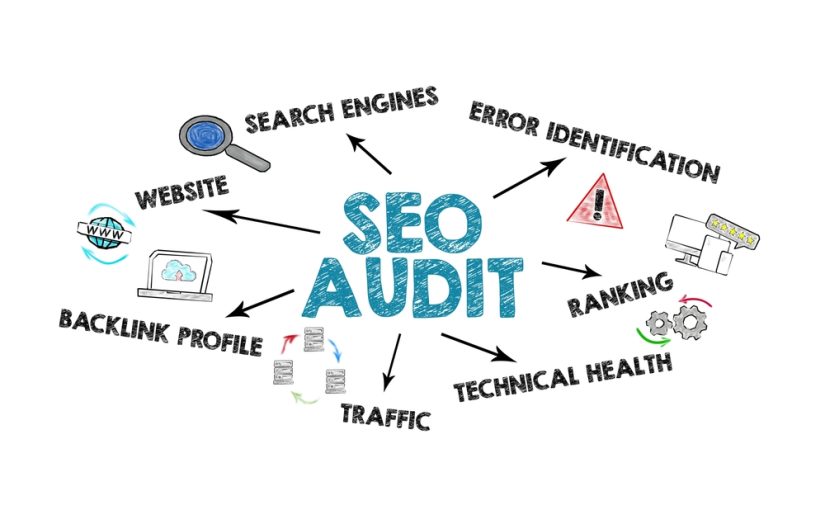
6 Reasons Why SEO Audits Are Essential for Your SEO Success 
Do you feel like your SEO efforts aren’t yielding the desired results? If so, maybe it’s time to invest in an SEO audit. An SEO audit is a comprehensive analysis of your website that helps you identify areas to improve so you can start seeing better returns on your SEO investment. And while SEO audits might not seem essential, they can actually be essential for helping you achieve SEO success in the long term. In this blog post, we’ll take a closer look at 6 reasons why SEO audits are essential for your SEO success. Dive in to learn why SEO audits are the secret sauce you need to take your SEO to the next level!
Analyzing Your SEO Performance
Before you can take action to make your website more search engine friendly, you need to evaluate its current performance. Analyzing your website’s SEO performance is critical for two reasons: first, it will provide you with insights into the areas of improvement that you need to focus on; and second, it will help you understand how effective your current SEO tactics are.
By conducting a comprehensive SEO audit, you’ll be able to gain insight into issues like keyword use, content optimization, link building, and more. You’ll also gain valuable insights into the quality of your competitor’s websites and how they’re achieving higher search engine rankings than yours.
An analysis of your competitors will allow you to evaluate their strengths and weaknesses relative to yours. This information can inform your strategy by providing clues as to where your own efforts may be coming up short. Additionally, this data can serve as benchmarks against which you can measure the progress of your own website optimization campaigns.
Moreover, conducting a thorough analysis of your website’s existing traffic sources will give you an idea of where the majority of your visitors are coming from and where they may have been directed from. This information can be used to improve both organic search results placement and user experience on your website, ultimately leading to better SEO success overall. The bottom line is that SEO audits should be done regularly in order to track changes in digital marketing strategy and monitor competitive shifts for optimal success.
With an understanding of how well your site is performing against competitors and industry standards, it’s time to move on to the next step in the process: measuring visibility in SERPs. Knowing how your website ranks in relation to coveted keyword phrases within a given search engine is essential for tracking progress over time and capitalizing on successes when opportunities arise.
Measure Your Visibility in SERPs
Measuring your visibility in search engine result pages (SERPs) is an essential part of regular SEO audits. Monitoring SERP performance helps you establish benchmarks, diagnose current problems and understand where potential opportunities may lie. By regularly checking your visibility in SERPs, you can track the performance of your website over time and accordingly adjust or pivot your overall SEO strategy.
It is important to note here that there are several factors that affect SERP visibility, such as the age of your content, recent changes to the algorithms used by search engines, and fluctuations in the content on competing websites. Naturally, this means tracking your SERP performance can be a tricky task that requires careful monitoring over time.
SEO experts have debated whether it is necessary to check rankings as part of an SEO audit. While some see this as a vital task for understanding a website’s visibility on SERPs, others think that it is a relatively useless exercise because ranking fluctuates so much. The truth is probably somewhere in between: while it may not make sense to obsess over precise rankings too much, tracking how well a website is performing on SERPs should still form part of any SEO audit.
By measuring your visibility in SERPs, then identifying errors and opportunities that arise from these measurements, you can ensure that any adjustments or pivots made to your SEO strategy have maximum impact on increasing traffic to your website. To uncover these errors and opportunities, let us turn our attention next to identifying them.
Identifying Errors and Opportunities
Conducting an SEO audit will help identify errors and opportunities for improvement. A thorough audit provides insight into the overall health of your website, helping you to pinpoint problem areas and maximize your success.
By taking the time to carefully evaluate strengths and weaknesses in your organic search engine optimization (SEO) strategy, you can better target efforts to improve performance and ensure that your site is achieving its purpose. Common errors can be identified by assessing keyword relevancy, link structure, image tagging, and other best practices. Analyzing competition can provide insight into what works in current SERPs and what doesn’t—providing opportunities for improvement.
Recognizing issues before they become costly repairs can be helpful in preventing problems with crawling or indexing that can harm a website’s visibility on search engine results pages (SERPs). On-page content can be monitored and analyzed to identify problems with structure, relevance, or use of important keywords that are essential for optimal performance in modern SERPs.
Not only will identifying errors within an SEO audit help you find solutions to existing issues with visibility on SERPs, it will also help you identify opportunities to strengthen content strategies via optimization of newly developed meta tags or titles, revisions to copy where necessary, testing new competitor strategies, revising link structure within navigation bars, etc. Identifying optimization opportunities relevant to current algorithms and technology will help drive more qualified traffic from high page ranking searches and improved visibility on SERPs.
In short, recognizing errors as well as opportunities for improvement through SEO audits helps ensure your website is secure, visible across various devices, functioning properly for all users regardless of browser or device type, optimized with quality content rich data generated specifically around user queries—all essential components of successful SEO strategies today. So now that you understand the value of conducting an SEO audit when it comes to identifying errors and opportunities for improved performance, let’s look at how secure your website might actually be.
How Secure is Your Website?
Ensuring that your website is secure should be a top priority when it comes to SEO audits. If your website isn’t secure, you risk losing both traffic and rankings in the SERPs.
One of the important things to look out for is whether or not your SSL certification is still active. If an internet user visits your webpage and receives an error message saying “Your connection is not secure”, chances are they won’t stay on the page for very long. Spending the time and resources to keep your security up to date is well worth it, as a secure website guarantees consumers that their information will remain safe while visiting your page.
Speaking of information, another vital factor to consider when assessing website security is what type of content you are collecting from visitors. Are you asking users to enter data like credit card details or billing addresses? If so, it’s important to have measures in place — like encryption technology — which protect the privacy of those inputted into forms. Knowing how secure your forms are can make all the difference in keeping potential customers on your page.
Aside from basic precautionary measures, there are several more sophisticated tools available for assessing website security and protection. Software like Sucuri helps detect malicious activities such as malware attacks and browser hijacking attempts, making sure no virus sneaks past unnoticed. Securing your site with tools like these can help keep web browsers coming back for more visits in the future.
In the next section we’ll be taking a look at how analyzing your content can help lead to SEO success by optimizing both search engine algorithms and user experiences alike.
Analyzing Your Content
Content is an incredibly important element when it comes to SEO success and a proper SEO audit should certainly provide an in-depth analysis of your content. You should look at both the quality and quantity of your content when conducting a successful SEO audit. After all, search engines reward websites that produce high-quality, relevant content and articles that are regularly updated with fresh information.
High quality content will go a long way towards improving your website’s presence in search engine results pages. On-page optimization techniques such as metadata and link building will help boost rankings, but if the content isn’t up to par, then you may be sacrificing search engine visibility. The best way to ensure you have well-written and structured content is to take the time to review each page on your site. A good SEO audit should include searching for common errors, typos, excessive use of keyword stuffing, and duplicate or redundant content. Additionally, make sure that headlines guide a reader through the article or page naturally and consider adding multimedia elements such as videos or images for added engagement.
The quantity of content is just as important as its quality. High quality paired with quantity can indicate to search engines that your site offers users a wealth of knowledge on a particular topic which can be attractive to readers. Sites that regularly post new and relevant content tend to rank higher than those that don’t update their material often (or don’t post any at all). It’s advised to produce interesting and applicable content on a regular basis in order for search engines to consider your site authoritative on its topics.
By analyzing both the quality and quantity of your content during an SEO audit, you can get an accurate assessment of how well your website is performing in terms of relevance in search engine results pages without having to sacrifice one aspect over another. Moving forward into the next section, an important factor to consider when analyzing content is whether you prioritize quality vs quantity.
Quality vs. Quantity
When it comes to SEO audits, understanding the difference between quality and quantity is essential. While both have their place in a successful SEO strategy, their strategies are drastically different.
Let’s start by looking at quality first. Quality should always be prioritized to maintain high website traffic acquirement and ranking. Achieving good results from quality content, such as long-form blog posts and custom graphics, can result in more organic web traffic. Along with this, focusing on optimizing keywords can help promote more precise queries that appear higher in search engine rankings.
On the other end of the spectrum is quantity. Acquiring as much content as possible with an emphasis on pageviews and overall online presence provides a cheaper alternative to increasing website traffic. For example, publishing content quickly and frequently can lead to increased site visits from users due to the amount of content published across various platforms.
Ultimately, neither approach is necessarily better or worse than the other; rather, it’s about determining what will work best for each individual business and its overall long-term goals. It may be helpful for businesses contemplating an SEO audit to evaluate whether their current strategy focuses on quality or quantity (or a combination of both) before diverting money into a new campaign.
The next section will focus on analyzing your overall SEO strategies to determine their effectiveness and potential areas of improvement. The insights offered by an audit can help inform your decision making process and ensure that you’re taking advantage of all available opportunities when constructing an effective SEO strategy.
Analyzing Your Overall SEO Strategies
Conducting an SEO audit helps you understand what your business is doing right and wrong in terms of search engine optimization. Any successful SEO audit should include a review of your overall SEO strategies — both current and past. By analyzing your overall strategies, you can spot potential gaps that need to be addressed, opportunities to improve your SEO performance, and potential trends in SEO that you may want to take advantage of.
When analyzing your overall SEO strategies, it’s important to look at how your content, keywords, and backlinks are working together to drive traffic. Are you using the right keywords? How effective are your backlinks? Are there areas where you could optimize or add more content? Answering these questions will help you identify any changes that might need to be made in order to improve your SEO performance.
At the same time, it’s important not to overlook the tactics that are already working. If certain strategies have been driving good results for your business, there’s no need to abandon them completely. Instead, focus on improving those tactics and building upon their success. This will ensure that you don’t miss out on any potential benefits from existing successful strategies.
By evaluating and improving your existing SEO strategies, as well as adding new ones where appropriate, you can create a comprehensive plan for achieving greater success with search engine optimization. With this knowledge in hand, you may even find yourself outpacing the competition — a topic we’ll discuss further in the next section: “Are You Outsmarting Your Competition?”.
Are You Outsmarting Your Competition?
It all starts with understanding where you stand in relation to the competition. It’s not enough to just measure your progress against your own web metrics – you need to understand how you measure up against what the competition is doing. While analyzing the SERPs of your competitors, look out for any new content they’re creating or relevant keywords they are targeting that you may be missing out on.
In comparison to others in your industry, are you at risk as a result of falling behind on SEO tactics? If so, what can you do to try and outsmart them? There are several things that you can do to close the gap between yourself and your competitors, such as changing up strategies like keyword optimization, creating high-quality content, or reorganizing existing content. Additionally, optimize valuable search phrases that your competitors might be neglecting.
Understanding whether or not you’re currently outsmarting your competition is essential for evaluating where your SEO efforts have landed you thus far. It provides insight into what areas could use improvement and reveals possible opportunities that exist for overtaking the competition within the SERPs.
The next step involves assessing your current SEO objectives so that improvements upon these objectives can be implemented. Assessing your SEO objectives will enable an organization to recognize performance issues which should be addressed in order to achieve success in organic search rankings.
- A 2017 analysis found that conducting regular website audits can increase overall website user engagement by up to 25%.
- A 2016 study of 500 websites showed that websites with comprehensive and regularly updated SEO audits saw an average 12% growth in organic traffic within 6 months.
- According to a 2015 survey of over 500 SEO experts, 91% believed that regularly auditing their clients’ websites was essential for improving organic search rankings.
Assessing Your SEO Objectives
An essential part of the SEO audit process is gaining a thorough understanding of your company’s objectives and desired outcomes when it comes to organic search performance. Without this crucial step, you won’t have a benchmark or road map on which to structure your audit.
It’s important to differentiate between short-term objectives such as increasing rankings for certain keywords, and long-term objectives such as optimizing your website for click-through rates and conversions. Both are important in their own way, but assessing each independently allows you to design a more effective SEO audit that addresses both sets of goals.
Similarly, it’s not enough to simply consider basic metrics such as ranking position, number of visits, and pageviews. If you want to gain a deeper insight into how your website is performing organically, you need to think about how key elements like content quality, internal linking structures, keyword research, and overall performance affect user experience. Analyzing these elements can reveal specific areas that need improvement or could benefit from revamping as part of an audit strategy.
Ultimately, the goal should be to ensure your website is properly optimized so that it meets all of your target objectives. That means finding ways to drive more organic traffic and conversions while improving page speed and optimizing content for both usability and search engine optimization (SEO). With this knowledge in hand, you’ll be well prepared for the next step: How to Implement an SEO Audit.
How to Implement an SEO Audit
When it comes to implementing an SEO audit, there are several approaches that can be taken. Depending on the size and complexity of the website, an audit may take a few hours or require a more detailed review of several weeks or even months. However, any investment in an audit is worth the effort as they can diagnose issues that might not be discovered by simply observing the website’s performance over time.
The first step in launching an SEO audit is to conduct extensive research. This involves conducting keyword and competitive research, as well as scanning some relevant industry trends and benchmarks. This should help develop a baseline for how competitive and successful a website’s strategy is already, as well as identify pain points that need fixing.
Next, analyze the website’s current structure and content. This includes checking for broken links, reviewing page titles and descriptions, looking at image Alt tags, examining domain authority (the amount of links pointing back to a website), as well as analyzing the speed of each web page. Every aspect of a website must be looked at from both an on-site perspective (i.e., what visitors see) and from the backend (i.e., HTML code, JavaScript etc.) since even small changes can make a big difference in visibility and success.
Once all of this has been done, the next step is to evaluate how well each webpage ranks compares to others in relevant search engine result pages (SERPs). Google Analytics should be used to identify where traffic is coming from, which queries are driving traffic and where visits convert into leads or sales. Additionally, improving indexing performance by getting more pages indexed by search engines can help boost rankings, since more indexed pages will help improve visibility on SERP results. Finally, tracking usability metrics such as bounce rates and backlinks can also help determine areas where improvements can be made to increase site visibility with potential customers or clients.
Overall, implementing an SEO audit is akin to having a comprehensive plan for success: identifying problems before they arise while helping ensure when they do arise they are dealt with quickly and effectively. Not only can audits give businesses valuable insights into marketing strategies they otherwise would have overlooked or neglected but they hold immense value in understanding what works – and what doesn’t – helping businesses stay ahead of their competition whilst increasing conversions and profits in equal measure.
Crucial Highlights
An SEO audit is invaluable for websites, as it diagnoses potential issues and helps businesses understand what works and what doesn’t. An effective audit requires extensive keyword and competitive research to establish a baseline, analyzing the website structure and content including broken links, page titles, descriptions, and domain authority, evaluating SERP rankings, and tracking userbility metrics. Ultimately, an SEO audit gives businesses valuable insights on their marketing strategies, helping them stay ahead of their competition while increasing profits.
Frequently Asked Questions
How can an SEO audit help optimize a website for search engine optimization?
An SEO audit can help optimize a website for search engine optimization (SEO) by identifying areas of improvement within a website’s structure, content, performance, and more. For example, an audit may evaluate the speed of loading pages, the use of internal links within the pages that are relevant to the keyword topics, the readability of the written content, and how mobile-friendly the structure is.
By improving these elements, online services can achieve higher rankings in search engine results. It will also be possible to detect any issues that might prevent a website from receiving its desired search engine visibility. By addressing these items early on through an SEO audit, businesses can set themselves up for success before they even start creating content or begin planning campaigns. Additionally, conducting regular SEO audits will help organizations stay ahead of potential competing websites as well as monitor changes to technical details like their meta descriptions or title tags.
What are the most common mistakes made during an SEO audit?
The most common mistakes made during an SEO audit are failing to accurately assess the website’s current performance, overlooking technical SEO issues, not properly analyzing keyword usage and targeting, focusing too much on rankings instead of the overall user experience, underestimating the importance of backlinks, and not adequately tracking progress.
Failing to accurately assess a website’s current performance means not accurately evaluating search engine visibility or traffic patterns, which could be indicative of how effectively a website is connecting with potential customers. Overlooking technical SEO issues can lead to poor page loading speeds and lack of accessibility for search engine crawlers. Not properly analyzing keyword usage and targeting can result in targeting irrelevant terms and missing opportunities to increase organic ranking. Focusing too much on rankings instead of the overall user experience can mean sacrificing quality content and structure for keyword stuffing or other potentially detrimental practices. Underestimating the importance of backlinks can lead to not having enough high-quality external links pointing to your site. Finally, not adequately tracking progress can make it difficult to measure the efficacy of any changes implemented from an SEO audit, as well as identify opportunities for improvement.
Overall, proper SEO audits address these common mistakes by ensuring your website is optimized for success across all areas that are essential for good search engine visibility.
What are the main benefits of conducting an SEO audit?
Conducting an SEO audit offers many benefits and is essential for achieving SEO success. An SEO audit will help you gain a better understanding of how to optimize your website in order to improve your search engine rankings and online visibility.
The main benefits include:
1. Identifying any issues with your website – The most important part of an SEO audit is identifying any problems that could be preventing visitors from finding, or engaging with your website. This could include faulty redirects, slow loading pages, HTML errors, poor internal linking, or missing tags that are necessary for search engine optimization. By resolving these potential issues, you can create a much more user-friendly experience and improve your website’s overall performance.
2. Improving organic traffic – Once the issues have been identified and fixed, the next step is to optimize your content for relevant keywords in order to drive more organic traffic to your website. Conducting keyword research and optimizing titles, meta descriptions, and other factors will help improve your rankings on SERPs (search engine result pages) and increase the amount of organic traffic to your site.
3. Analyzing competitors’ websites – Another benefit of conducting an SEO audit is that you can use it as an opportunity to analyze how your competitors are optimizing their sites. Looking at their keywords, backlinks, site structure, and content strategies can give you valuable insights into what they’re doing right and what areas they may need to improve upon. This enlightenment can then be used to help you create a more effective strategy for improving your own rankings.
Overall, an SEO audit provides invaluable insight into how well optimized a website is and helps identify areas where improvements can be made in order to reach the desired level of success. By understanding emerging trends and analyzing competitors’ websites, businesses can leverage this information to create better strategies for achieving SEO success.







